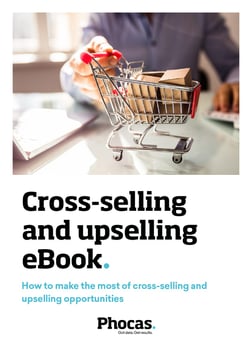Upsell, Don’t Push Sell: Essentials for Successful Upselling

In an era where customers are more difficult to acquire and sales are harder to make, sales strategies that focus on current customers are absolutely crucial. In this blog, we will cover another sales strategy: upselling.
Upselling is similar to cross selling but it is a different sales strategy altogether. While cross selling revolves around offering relevant, complementary solutions, upselling is focused on offering more, or better versions.
We refer to upselling as a sales strategy whereby we convert an initial order into a more profitable order by way of additional units or a more premium version of the product / service. The upsell offer is typically made when the initial order is being placed. It is one of the tried and true sales strategies to improve the bottom line almost immediately.
It may sound like a simple strategy, but a lot of salespeople continue to try and fail at it. One of the main reasons salespeople fail to upsell is because they are too pushy in making the offer.
Below, we highlight the three tactics your sales team needs to successfully upsell:
1. Customer needs vs. your sales targets
As with any other sales opportunity, it is important for salespeople to focus on what your customer needs, not on what you want to sell. Keep your sales targets in mind, but don’t make the upsell offer to meet this target. If you are only focused on meeting sales targets and you keep pushing the offer, you may not only fail in upselling, but your customer may retract their order altogether.
It is therefore important that your sales team looks at it from the customer’s point of view, to determine whether the upsell offer will satisfy their needs. Once it has satisfied this criterion, you have a better chance of getting a positive response to your upsell offer.
2. Upcoming needs vs. historical purchases
Similar to cross selling, prior to any upsell opportunity, you need to have data on what your customers have been purchasing from you. Cross sell opportunities tend to be very obvious from this data, but identifying upsell opportunities will need a closer look.
When you look into historical data of your customers’ prior purchases, don't focus on what they have bought and instead take a closer look into their market as a whole to identify what they could buy. Essentially, your thorough understanding of their market can help you make a more relevant upsell offer, instead of making a product pitch, which will improve the chances of making the bigger sale.
3. Grouping products vs. single products
Grouped offers that are offered at a package rate tend to generate better results than single offers. By looking at your customer’s purchase data and identifying their buying habits such as orders of multiple units, there is an opportunity for you to offer a packaged price.
Once the opportunity is identified, make the offer to your customer by way of giving them a better deal through a bulk discount, rather than pushing for an additional product. This will again increase the chances of them taking the upsell offer.
The role of Business Intelligence Software in Upselling
The success of these three tactics depends on the skills of your sales team, and more importantly, the data in your system.
Even if your sales team is comprised of sales superstars who are extremely accomplished in their fields, upselling will only be done if they see an opportunity for it to happen during the interaction. To improve sales results, use upselling as a sales strategy that you consciously prepare for.
The key is to have a tool that gives you complete visibility of your customer’s information, from the markets they’re in and the purchases they’ve made in the past. This will enable you to understand their needs and use historical data to forecast their future needs.
With the right tool, you can access critical data and give your salespeople the opportunity to identify upsell opportunities beforehand, prepare for it, and leverage one of the three tactics above to make a visible impact on your bottom line.
To gain a more comprehensive insight into upselling, download our free Guide to Upselling and Cross Selling by clicking on the button below.

Empowering businesses with intuitive data analytics, driving informed decisions for growth and profitability. We make people feel good about data.

What is sales and operations planning (S&OP)
Sales and operational planning (S&OP) helps businesses to align their strategic goals with day-to-day operations. By integrating financial planning with operational and sales planning, S&OP ensures that all departments work cohesively towards common objectives. This process operates on strategic and tactical levels, providing insights that influence long-term decisions while guiding day-to-day actions. Understanding the dual focus of S&OP is essential for creating a robust plan that addresses immediate needs while positioning the company for future success.
Read more
What is Integrated Business Planning (IBP)?
Imagine a soccer team, where each player operates independently, unaware of their teammates' actions and strategies. The forward charges ahead without knowing where the midfielders are, while the defenders are left guessing the goalkeeper's next move. Chaos ensues, and the likelihood of winning plummets. In contrast, a well-coordinated team, communicating effectively, and working towards a common goal, significantly increases its chances of success. This analogy mirrors the concept of Integrated Business Planning (IBP) in a business context. Just as a successful soccer team requires cohesive strategy and communication, a business thrives when its departments are aligned and collaborative.
Read more
Sales performance metrics drive high-performing and happy sales teams
Imagine a football coach who never reviews game footage, ignores player and game metrics, including wins and losses, and makes strategic decisions based solely on gut feelings. The likelihood of such a coach leading a team to victory is slim. Similarly, businesses that do not measure sales metrics risk missing out on critical insights that could propel them toward success.
Read more
When to use an operating budget for more detailed planning
What is an operating budget? An operating budget is a resourceful tool that enables businesses to estimate income projections and expected expenses and plan for low-earning or high-spending months. This financial plan provides data that constantly records the costs of your business operations for a specific period (mainly up to the end of the year). It also serves as an outline detailing how much money a company spends and incurring expenses.
Read more
Find out how our platform gives you the visibility you need to get more done.
Get your demo today